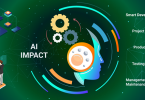Artificial intelligence has recently evolved from a futuristic promise to an innovative model. This technology is becoming present in all sectors of the economy. For the past few years, artificial intelligence has also been revolutionizing healthcare. In what ways?
Let’s find out.

Artificial intelligence (AI), especially machine learning, is effectively helping healthcare professionals process medical data, provide quick access to patient health information, and thus improve staff efficiency and patient experience. Below you will find some concrete examples of AI applications in the daily operations of hospitals and medical facilities. Some of them are truly impressive. Read the article to the end and see for yourself.
Preventive medicine
Artificial intelligence using connected medical devices (IoT) plays a significant role in providing people with preventive health care. More and more people are opting to use wearable devices to track daily health statistics. This allows patients to monitor their health information. In turn, doctors, thanks to AI, can gain insight into their patients’ daily habits and needs. This permits them to guide, inform and support each other in the best possible way.
Early detection of disease
AI’s computing power enables healthcare professionals to monitor patients more effectively and detect potentially deadly risks at an earlier and more easily treatable stage. For example, in the case of heart disease, doctors can use connected devices to track a patient’s heart rate and monitor an electrocardiogram, allowing doctors to detect and diagnose heart disease early.
Similar is true with breast cancer detection. AI is currently being used to analyze mammograms. The scanning speed with AI is much faster and more efficient than human analysis of the results. In addition, AI can detect microscopic metastases that humans are likely to miss.
Preventing pandemics
Patients increasingly rely on search engines such as Google to check their symptoms online before visiting a doctor. Using AI to monitor this trend and learn from it could lead to early intervention in the event of a possible outbreak in the population.
Medical Records Management
A patient’s medical records are a gold mine. But unfortunately, sorting it out requires human effort and time. That’s where the computing power of artificial intelligence comes in, which can do without medical personnel interference and analyze and organize the documentation much faster than a human would.
The future of healthcare
As you might have seen, innovative technology can improve healthcare operations. But, of course, the above examples are just a tiny fraction of the cases of AI in healthcare. Increasingly, as we look at the use of chatbots to communicate with patients and robots supporting surgery.
As a result, AI is opening a new chapter in healthcare. Not surprisingly, medical facilities are increasingly creating frameworks that favor implementing and developing new technologies.
For more information, visit: https://addepto.com/ai-consulting/



Leave a Comment